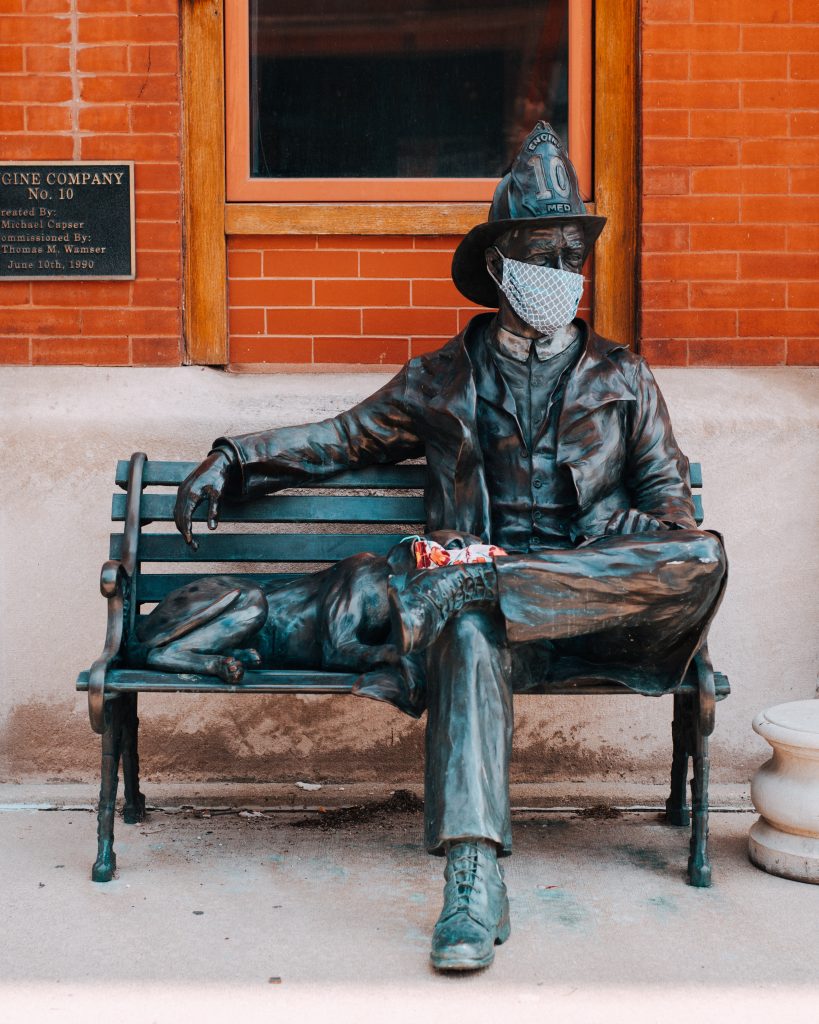A guest post by Regan Durkin
Do you remember the first time you saw in the headlines “COVID-19 Outbreak”? Do you remember when you first heard it classified as a pandemic? What did you think, what did you feel, in that moment?
I’d guess we all had a moment at some point when fear creeped in. The interesting thing about fear is, people can have two responses—to be courageous or to be a coward. As humanity had a choice to be courageous or cowardly, we saw leaders and civilians alike respond to the call with compassion, and others react to the situation with judgement (and many other responses in between).

Inevitably, we are not only fighting a deadly virus, but an infection that has plagued our world since the beginning of time—hate. We saw governments scapegoat minorities, neighbors blame neighbors who are different than them, and students bullying certain races in the hallways of our schools. Unfortunately, this cowardly response is not new. This is a reaction that humans have always had in times of crisis, and tragically it is no different in 2020.
Even in the world’s leading democracies, we saw governing bodies utilize a pandemic as a curtain for covering up oppression. In South Korea, a nation applauded globally for their containment of COVID-19, one of their first responses to the outbreak was anything short of strategic. The Korean government blamed the outbreak on a local church, Shincheonji. A church the world had never heard of became the headline on international news channels, and slander began to spread rapidly about the church.
Not only was the church blamed, the government ultimately breached privacy of church members which led to an outbreak in persecution, raided the church’s headquarters, contrived arrest warrants for the church leaders and Chairman, froze the church’s assets, and the list goes on.
Is this the precedent a democracy wants to set? That a global pandemic is grounds to target a minority group?
Many leaders and organizations have shied away from intervening because the situation is so controversial. However, should leaders shy away from controversy?
As scientists, if we only look at this pandemic as a health crisis we have missed the point. The world we live in is controversial. It is complex. A virus is not simply a science problem; it is a human problem that intersects and exacerbates other human problems.
If someone came to you as a leader in the sciences to comment on this issue, how would you use your expertise to provide objective feedback that would also stand up for human rights?
I challenge you to consider this situation, first, because it is worth considering for the sake of our fellow humanity, and two, because history is likely to repeat itself. It is guaranteed that you, too, will confront a moment in your career when you will have to choose to cower from a difficult situation or courageously fight for justice in the midst of a complex, unpopular situation.
If anything, this pandemic has taught us many lessons. One of which is that our world needs leaders in science who care beyond the data. We need leaders who are not only experts, but courageous and compassionate. Let’s all be those leaders.

Regan Durkin began her career in social entrepreneurship. Her first business used aquaponic technology to create entrepreneurship education greenhouses in Athens, GA. She continued pursuing her passion for entrepreneurship education serving at the Robin and Doug Shore Entrepreneurship Center at Kennesaw State University, and later launching Atlanta’s first middle grades social entrepreneurship program. Currently, Regan is an education consultant, mainly with the Ministry of Education on the island of Dominica implementing peace education. Her passions have expanded beyond entrepreneurship education, and now Regan applies her entrepreneurial mindset to advancing advocacy work for women and religious minorities in Washington, DC.
Copyright © 2016-2020 STEMM Leadership




The Pandemic is 100% a human issue and not a purely scientific one. The thing that I would say was the most troubling to me was the gap in knowledge of acquiring and dissemination of viruses between the scientific community and the average person. What was more startling was the lack of effort to bridging the gap by the leaders in the scientific community. For months people on social media platforms were debating the validity of people being immune to the virus and not being able to contract the virus again once they have contracted COVID. Some of which, are people who get the flu vaccine EVERY YEAR, because you can catch a new/varying strain of the flu EVERY YEAR. They do this every year without question, but when the same entity by a different name comes along (COVID vs Influenza) we act as if the same rules do not apply. I think sometimes our need to appease the masses with the K.I.S.S (Keep It Simple Stupid) method hinders us from being able to fully digested and truly formulate our own opinion when it comes to a situation. Thereby allowing us to act rationally as oppose the with fear and panic as we are unfortunately seeing.
The intersection between and the outbreak and scientist response has always been controversial because as scientist are taught to go with the data and not allow emotions control them, however, there will be a time to use moral compass to care about human right for our fellow citizen. We cannot just be fixated on data and remove compassion from people. This is on the backdrop of scientist being able to effectively communicate their finding, treated in a way that encompass civil and human right and making sure political leaders are seeing people and not violating their rights. The breach of data and violence against the local church in south Korea is fundamentally wrong and using people as scape goat to advance one agenda even in the best of intentions violate human right. As scientist we need to boldly face injustice and stand against it.
As Regan said, I also think that this panic is more than just a global health crisis because this virus, as a human problem, intersects with other problems. This panic is a human, economic, and social crisis that has affected all people, so all people had to help and support each other to overcome this pandemic rather than imposing their prejudiced beliefs on others. Also, this pandemic should not become politicized to be seen for some benefits that they could get from this uncertain time. Not only do scientists have to investigate this pandemic, but also leaders have to consider this crisis as a global problem. Leaders always play an essential role, especially during this uncertain time, so they have to speak up no matter how controversial this crisis would be. Leaders not only have to speak up, but they need to tell people the truth, which it would help raise public awareness during this crisis. Also, leaders should know what is going around them and try to end the pandemic through finding the ways to fix the crisis. I would say most leaders see these steps as an option and not a responsibility, so they choose to either follow those right steps or just start a blame war and target certain groups, places, countries, and people for it. Besides, knowing more about this virus and investigating its effect could help to solve issues regarding this virus. Therefore, entrepreneurs, scientists, and leaders have to conduct research to improve their knowledge. In addition, leaders have to report the information that obtained from researches, investigations, analyses, and studies to people to knowledges about this crisis. Therefore, in a pandemic, all people should work with one another with the guidance of their leaders in the right direction to be able to fix this crisis.
I’ve never thought about the interconnecting relationship between science with human rights. Undisputedly, this pandemic isn’t just a global health issue anymore; it’s no longer a viral infection of health but an infection deeply rooted in people’s unalienated rights. A destructive virus is not the only thing that this pandemic brought; it has drawn the world’s plague into the light. There have been videos circling social media since the pandemic panic, and among the chaos, we have seen individuals exhibit the nastiest qualities of humanity. From stealing and robbing, individuals are injuring and murdering others over the essential supplies. I believe miscommunication plays a tremendous role in stimulating these undesirable traits in humans. We entrust the governments and many organizations’ leaders to protect our needs and our rights as well. Many have failed to meet the standards, and as a result, we see all these destructions within our society. The leaders should effectively communicate with the public to ensure that people can rely on them.
Furthermore, instead of shamelessly blaming other people, we should join forces to solve the problems rather than making the problem bigger. As leaders of the world, they should be the first to take action against these threats. If the leaders do not step up now with the current pandemic, how can we possibly overcome the future crises when new, deadlier viruses arise?
I began presenting COVID symptoms two days before the WHO declared the COVID-19 pandemic, so on a personal level, I already felt it was real and was very concerned. I put myself in isolation while trying to get tested.
Before March, I felt concerned, but a naive sense of reassurance that our public health system in the U.S. would handle it and we’d be ok as a country regarding this disease, but as we’re now in the 8th month of the pandemic, and I was unfortunately incorrect.
I come from a public health background and a cornerstone of public health is social justice and cultural competency. Unfortunately, public health practiced in other areas isn’t always as committed to those tenets, such as the example of the treatment of that religious minority in Korea given in the post.
In the U.S., compassionate, courageous, and culturally competent response of this pandemic would have been to act swiftly with available information, begin public awareness campaigns early with cultural relevant messaging to specific demographics as needed (keeping language barriers, cultural practices, cultural norms in mind), to address socioeconomic issues, etc and institute measures that address the other social determinants of health.
The moment I saw the headline “COVID-19 outbreak” the first thing I thought was “Oh well, not a big deal, its just a rumor.” I worked at Wellstar medical hospital, as days passed by COVID-19 started to spread faster and I started check the COVID status on the Georgia Health Department and each day the numbers increased day by day, and I started to panic. I encountered many patients with COVID and even saw them die. I did not want to be a coward and back out of the situation we were in. I wanted to be a leader to help people during this crisis. I wanted to be an example of a leader to help fight this virus. In order to protect my family, I moved out of and got a place to stay and got to see my family after 2 months. I agree with Regan this virus is not simply a science, its a human problem. I faced situation where extended family and friends were so judgmental that I worked during COVID and I put my family into a critical situation and “spreading exposure” to them. I was a stubborn child that will not listen to my parents and just stay home. I stood up for myself to serve the patient and handle to the situation. This pandemic has taught me many valuable lessons, one is to be a leader and make firm decision during crisis like this.
I thought that this post was interesting in bringing up that we need scientist that care more than about the data. Life is indeed complex, and during a time like this we need to be able to show compassion and begin helping others. I believe that this pandemic has allowed us to shed light on certain issues of our world that we may have been avoiding such as racial discrimination and oppression. No matter how controversial, leaders need to speak up during such a crisis, and speak up in a way that allow us to be courageous and lead the country in a better direction. We need to learn from this and grow to become a better world that remembers what is like to care for others.
Reading over Regan’s post, I wholeheartedly agree. This pandemic is more than just a global health issue. This pandemic has been used by people to try and validate their discriminatory views towards others. Instead of people coming together to support one another and try to curb the virus, the issue has become politicized for personal gain. It’s sad because you would think that people would trust scientists who have been training and performing research for years in their respective fields. They provide all this data about the virus and how best to flatten the curve and yet people instead laugh at them and would rather believe that the scientists are just inducing paranoia and mass hysteria for some unknown agenda.
I also really enjoyed Regan’s presentation. At first glance you would think that entrepreneurship and biology would be two incompatible subjects, but with further inspection the core components seem to be similar. Both an entrepreneur and a scientist require much dedication to time and effort in order to reach a point where they can feel satisfied and even then, there is always that drive to continue to learn. Both also require proper research and knowledge about their respective topics of choice. For scientists, you need to conduct research in your concentration in order to advance your knowledge to increase your understanding. For entrepreneurs, you need to conduct research into the area of business that you want to operate in so that you can become more knowledgeable about it and grow a successful business
Yes, reading your comment allowed me to realize how this pandemic will something that last a little longer due to people picking side and using this a political talking point. It seems as if even when the vaccine comes out some will refuse because they are saying this is a government plot. As a entrepreneur we should be able to communicate our point of view to the masses about the need for a organize response and as scientist we need to trust in the data, but not at the expense of violating human right.
I could have never said it better myself. This pandemic is far from just a global health crisis. It has brought out the ugliest traits of humanity that we had chosen to ignore all this time, traits that are only seen during moments of struggles. People blame each other for spreading the virus. They excessively buy all the necessary supplies, leaving others to search hopelessly for them. They even go as far as to attack minority groups even though this situation is nobody’s fault at all. Not even the leaders! Of course, there could have been better ways for them to handle this situation, and they should not shy away from controversy at all. They will always be involved in controversy no matter what they do anyway, so why not just do whatever it takes to improve the situation? If they cared for their countries, they would listen to experts and try to find every way they possibly can to fix the crisis. If someone were to come to me for my expertise, I would first advise that person to not invoke panic nor downplay the situation. This pandemic showed us that miscommunication was the biggest issue. I would try my best to communicate my research and data in a way where it won’t be misunderstood. I would want it to be reported in a way where the people would be knowledgable enough to know how serious this is without being too paranoid.
Reading your comment and others showed how we can all agreeon the same way of solving this problem. Strengthening communication, thinking critically, expanding knowledge about the virus, and helping each other during this uncertain time can help to improve ourreactions to this pandemic and solve this crisis. As you said, we have to improve our communication because one of the things that thispandemic showed us was the lack of communication. Also, leaders have to help improve this pandemic through raising their knowledge, thinking critically, and guiding people rather than insulting groups for their reactions to this crisis without having anyknowledge. Moreover, lack of knowledge showed us how displeasing the situation could getduring a pandemic, even though we live in a modern world.
Hi Sara,
I agree with your comment, especially about leaders. Many of them have miscommunicated or misunderstood the facts. This might not affect some of us who know enough not to believe everything, but people follow these leaders in every move. We need more leaders especially in the field of science to properly address this miscommunication and prevent it in the future.
No one could have imagined that we would be facing these issues we are facing today. I cannot imagine the amount of pressure a leader must feel in a time of crisis. The pressure to make decisions and to “fix” and solve issues is intense for leaders of society. Being a leader already requires a great amount of responsibility, and in a time of crisis that responsibility increases. Society should keep that in mind when we are critiquing leaders who have to be in charge. If someone came to me as a leader in the sciences to comment on this ongoing issue; I would tell them that they have to be sure to tell the public the truth.Tell the public facts, not feelings. I would also advise that this is a virus, and it does not pick and choose who can spread it. A virus does not see color, religion, race, or gender. We as a community need to stand up to fight it together, and we do not need to place blame on a certain groups of people. All people, no matter the race,religion, or gender, need to have universal rights and practice universal preventative measures.
I agree that leaders need to be honest with their people and it is the right of people to know the truth, especially about this crisis that has affected many things. In some countries, people don’t stick together, but do anything to pass the blame from a group to another. As you said, being united is an important message that these pandemics give us, so all people with the guide of leaders have to help each other as a society to fix this issue. If we could control the way that we react, most inside community insults would stop. Following the rules not only keep us safe, but also show our respect to experts who work to keep us away from getting the virus. Also, as you said, this virus does not see race, color, etc. and it is equally dangerous for everyone, so to end this crisis, all people have to stand against it as a community.
I think it’s really easy for me to say from my position that I believe leaders should not cower from controversy. By definition, leaders should be strong and take problems head on. However I believe it’s hard to say what exactly the right move is in a situation like a pandemic. There are people who are immunocompromised, older, or generally at risk to have serious complications when it comes to Covid. They are rightfully scared and should be protected. Then there are people who are healthy, ready to go back to work, and don’t want to put their lives on hold. Both are valid in my opinion, so how as a leader do you both appease and protect the majority? Unfortunately in crisis, democracy moves very slow. Democracy also involves many opinions among leaders, most contrasting one another. I think that this situation should lead us to be more understanding and not as quick to judge. It should also be a learning experience to think “what would I really do in a situation like this?”
I agree the fact that we want and believe leaders should take problems head on, and should be able to resolve them; however that cannot always be the case. In the perfect world, leaders, no matter what platform they are on (community level, national, or even global) should be able to tackle issues that rise and not back down. In this pandemic like you said, there are two groups of people that have emerged- those that that want to resume their lives and those that want to continue staying home/being safe. Being a leader in this situation would not be easy, if one decision is mandated, the other group will be upset, and considering America is a democracy everyone’s opinions and feelings are valid. Right now being a leader boils down to the question of “what can I do to help the betterment of this country/ the people” vs “what group can I please”.
I definitely agree that this pandemic is a human issue as well as a science issue. I have been so surprised at the ways that COVID-19 has impacted our lives that I did not expect. For example, I did not expect that we would be seeing meat shortages as outbreaks at meat processing plants slow production.
Generally, I believe that leaders should absolutely face controversies head on, but I am learning that courageous action is not all that is needed to combat complex issues. Watching the response to the pandemic has taught me the importance of cooperation between leaders and agencies for the greater good of everyone. In times like these, leaders must consider not only the well-being of themselves or their organization, but the well-being of all. Cooperation is imperative for containing the spread of COVID-19 and for distributing resources to those who need them. Leaders should come together with open minds in addition to courage, so that cooperation is possible. When massive problems are tackled with a great deal of coordination and cooperation from multiple entities, the outcome is much more likely to be a desired one. When leaders act in according to their own self-interest, they are almost always working against one another. In a pandemic, working against one another instead of with one another leads to tragic results.
I believe that leaders should stand in being a leader, completely, meaning that you must chose to stand tall in the face of oppression and marginalization, no matter how “difficult” a situation or circumstance may be. Let’s remind ourselves, that leaders CHOOSE to be leaders, so they should know or at least expect that it is not an easy task. I also agree that science isn’t the only important aspect of the virus. All of the many things that have happened because of this pandemic should also be taken seriously. It is important to note that Black people in America have been disproportionately affected by the ongoing pandemic. Poverty and access to adequate healthcare plays a huge role in this issue, and people tend to forget this. Leaders in science need to also dedicate their time to removing the barriers placed upon minority groups such as African Americans, if they really want to achieve health equity, because everybody should have a fair chance at being as healthy as possible.
Of course I do not believe that leaders should shy away from controversy but I think the circumstance they are in should be taken into consideration as well. By no means am I saying what South Korea did was right but making decisions for a whole country is not an easy task. This pandemic was not something anyone was prepared for and as mentioned in the post it caused fear and some leaders had the correct response and some did not. I agree with the fact that this pandemic has taught us as individuals or as a country a lot about where we stand, what are strengths and weaknesses are, and hopefully how to improve our actions for the next pandemic or similar events.
As a scientist I would look at facts without bias, triple check everything, and most importantly ensure that the information I am providing is represented accurately to the public. The media played a big role on some negative aspects of this pandemic which probably could have been avoided if there were more reliable news outlets who put people’s lives before making profit.
Reading through Regan’s blog and her questions she is asking us to think about – I definitely feel that leaders should not shy away from controversy. Leaders are looked to for guidance, as experts, and others may blindly follow the leaders. By addressing the matter in a responsible way to quell any misconceptions, targeting of specific groups, and potential violence is critical in helping the public understand what is going on and what is expected of them through these times. I know when I first heard we were in a pandemic, it seemed surreal and almost as if “they are joking”. However, my science background told me otherwise especially since my focus has been on microbiology. Can you imagine the fear and panic of the general public who have no science background? Or even the disbelief that a pandemic really exists? This is where leaders need to step in and educate the public about the science of the pandemic that includes how viruses are transmitted, how they function, and where they originate from. It is also important for science and other leaders to have a responsible, fair and factual agreed upon response as this will help quell the targeting and oppression of others. Also, by giving people a course of action they can actually do and is consistent across the country, this could help suppress the fear and panic (example is mandatory masks and sanitizing strategies). It is a leader’s responsibility to help decrease any “blaming/finger pointing” at other people and to stop oppression and judgement. Therefore, if others were to approach me as a leader, I would explain with facts how the virus originated, how it spreads, measures to stay safe, and most of all stress we are all in this together. It would be important to stress no one is to blame for where the virus started and use examples for how quickly a virus could spread by using the cold virus for simplification purposes. As a leader it is also important to convey the facts of a novel virus, how information is lacking, and how the science community is working diligently to uncover more information, sharing in a timely manner, and finding ways to protect the public. I truly believe a leader should show sound judgement, act swiftly and address controversary, show compassion, and share vulnerability (lack of knowledge for example) but most of all stressing the importance of all to be treated equally and fairly. In addition, when a minority group is attacked, the leader should respond and address it immediately to keep it from escalating. I believe these points are all critical in helping people through a pandemic to help reduce the fear and panic people are feeling – compassion, hope, and positivity will help!
I think if I were in the shoes of a leader that belonged to one of the powerful countries in the world, I would make impartial decisions. A just leader wouldn’t care if the situation was controversial. He would stand with what’s right, even if it means sacrificing their career. We as humans are at a fault for blaming other people when all we have to do is act unbiased in a situation, and show some compassion for others. Blaming someone just because they are a different skin color or they belong to a different faith is not going to get us anywhere as a human race. Nowadays, people are not willing to acknowledge what is going on around them, and when a devastating situation arises, they judge without understanding both sides of the picture. As we have been observing in the U.S, if the lock down had been put in place from the start and if the people had remained under lock down for long enough, our leaders wouldn’t be trying to blame their wrongdoings on other people or countries. We wouldn’t have an increase in COVID-19 cases. I think a lot of self-reflection is needed before we decide to act hastily, and that is something people and the leaders are not willing to do. Self-reflection allows us to look deep within ourselves and try to improve our attitude and our way of thinking.
I am one that believes that a leader should never shy away from controversy. A lot of leaders are looked up to and are capable of invoking necessary change. However, being silent is equivalent to a declaration of compliance. If leaders are able to remain silents when justice is needed, then they might as well exclaim that they are on the side of injustice. If I were to reply to a leader that spoke about this issue, I of course would want to make sure that he was speaking off of facts and if he had any opinions, it would be opinion that would prevent his listeners from violating the Human Rights of others and to encourage others to be kind in spite of circumstances. Compassion is something that is needed especially in a pandemic where a lot of things are becoming out our control. Putting the blame on others will not help anyone and only make our problems worse.